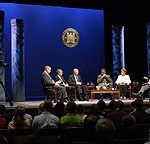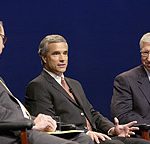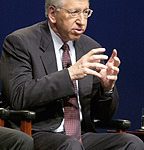Members of a distinguished panel discussed the latest reform efforts in intercollegiate athletics during a program Thursday, Sept. 4 in McCrary Theatre. Details and photos...

The panel, chaired by William Friday, president emeritus of the University of North Carolina, featured NCAA president Myles Brand; ESPN college basketball analyst Len Elmore; Wake Forest University president Thomas Hearn; Southern Conference commissioner Danny Morrison; and NC State women’s basketball coach Kay Yow.
The panelists agreed that many of the current scandals in intercollegiate athletics, such as those at Baylor University, Ohio State University and others, can be traced to the growing influence of money.
“I’ve ceased to think of the reform movement as something with a conclusion, from which we will move on,” said Hearn, who along with Friday has served on the Knight Commission on athletic reform. “There is a different culture today, one of a professional and business nature,” Hearn said, lamenting the end of a society where sports was seen as a healthy, wholesome activity for young people, with its roots in schools, churches and the community. “More and more, young people are looking at college sports not as a learning opportunity, but as the first step in business.”

Morrison pointed out though that for schools that don’t receive large sums of money from television contracts and apparel deals, commercialization is helpful. “Commercialization gets a bad name because of excessiveness. But at our level, it’s pretty helpful,” Morrison said, citing the example of TIAA-CREF, which sponsors the Southern Conference’s academic awards program. “Commercialization is not necessarily inherently bad, only when it becomes excessive.”
Brand, who testified earlier in the day before a congressional committee in Washington, D.C. about the current Bowl Championship Series in college football, said colleges and universities must return to a philosophy that includes athletics as a part of the overall learning process for students, not a separate entity.

“These are academic institutions and the key is to find the way that intercollegiate athletics can be integrated into that mission. The most important step is to make academic reform,” Brand said.
Elmore, an attorney and former basketball All-American at the University of Maryland, cautioned that reform should take a balanced approach.
“We have to look at the execution (of reform efforts),” Elmore told the audience of 550. “The rhetoric is all in the right direction, and we should force young people to understand there are expectations in exchange for participation on the field.” But he criticized the NCAA for a recent decision to abolish minimum standardized test scores as one of the criterion for initial eligibility for freshman athletes, saying it could lead to more fraud and misconduct at the high school level.
“To do away with the SAT, regardless of the well-intentioned motivation behind it, is a problem and a mistake,” Elmore said. “To put the onus totally on the core courses you take in high school is a mistake. You’re going to have some teachers who will say, ‘Am I going to be the one to ruin that kid’s opportunity to go to college? Of course not.’”
Yow, a Hall of Fame member who began her coaching career at Elon in the 1970s, said college coaches understand they are being scrutinized for the behavior of their players, both on the field and in the classroom. “Presidents are starting to take action where action is needed. We are being held more accountable now than we ever have been.”
Brand said he believes there is a good-faith effort among coaches to re-examine their responsibilities, as evidenced by a mandatory Oct. 15 meeting called by the National Association of Basketball coaches to address recent wrongdoings.
“Basketball coaches are offended by the bad actors among them,” Brand said. “They are beginning to say that the integrity of that profession is being harmed, and they will make statements to that effect.”
Brand also said it is incumbent upon those in higher education to achieve reform, without intervention from Congress. “The Congressmen and women, just like everyone else in the United States, are very interested in college sports,” Brand said. “They have great interest in making sure the games are fair and (are played) with integrity, and their interests are proper. But they’re not going to intervene unless we screw up, to tell you the truth.”
Despite recent difficulties, Brand sees a bright future for college athletics.
“I am optimistic. Not blindly and naively optimistic, but I am optimistic. It will not be easy and we will never be perfect. We will never satisfy our critics, because they are in the business of being critics. But that’s okay, because they are saying things that maybe we don’t want to hear but we need to hear, because they are important and right.”
Yow challenged leaders in the reform movement to ask the right questions, and to abandon the philosophy that college sports must be looked upon as a business.
“You have to have the mindset that this is about education. We are in a university setting. We are not a business.”


